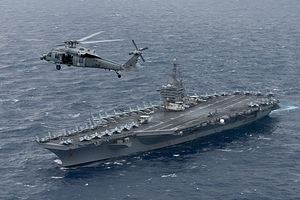As China brashly tries to impose its own system of rules and order in the Pacific, the United States and our allies in the Indo-Pacific confront a time for choosing. We must choose to advance our vision for a free and open Indo-Pacific. We must choose to ensure the success of the principles of regional and global order that remain essential to our shared security and prosperity. These are difficult choices that will come at increasingly greater cost. Beijing will do its best to make sure that the right choice and the easy choice are never the same, but we believe Americans and our allies are up to the task.
For instance, U.S. allies like Australia are already making the tough choices, while braving Beijing’s bluster and bullying. By standing by its calls for an independent inquiry into the origins of the coronavirus and by remaining open to trade while refusing to trade away fundamental values, Australia has set a proud example for all the world. As Beijing lashes out across the region from the Himalayan Mountains to the South China Sea, Australia’s actions serve as a reminder for our other allies that in a free and open Indo-Pacific, right makes might — and not the other way around.
Australia should not be alone in this effort. The United States stands with our allies, and we are prepared to make our own tough choices.
In the United States, we have seen how even in the most rancorous political times, Republicans and Democrats have joined together to renew the country’s commitment to the Indo-Pacific region, like when the Asia Reassurance Initiative Act (ARIA) became law in December 2018. As was stated in the U.S. Department of Defense Indo-Pacific Strategy Report, released in July 2019: “This legislation enshrines a generational whole-of-government policy framework that demonstrates U.S. commitment to a free and open Indo-Pacific region and includes initiatives that promote sovereignty, rule of law, democracy, economic engagement, and regional security.”
In the coming days, the U.S. Senate will take the next step toward renewing the country’s commitment to the Indo-Pacific region by passing the National Defense Authorization Act for Fiscal Year 2021, which establishes a new Pacific Deterrence Initiative that will complement ARIA and implement its vision of a more robust U.S military presence in the Indo-Pacific. This initiative will enhance the security commitments set forth in ARIA, and help guide Congress and the Pentagon in making the tough choices necessary to prioritize the Indo-Pacific and extend critical deterrence initiatives to check our adversaries.
Last year, a seminal report from the United States Studies Centre (USSC) at the University of Sydney provided one of the clearest explanations of why the need for the Pacific Deterrence Initiative is both real and urgent. The report shows how China is attempting to “undercut America’s military primacy” and “sowing doubt about Washington’s security guarantees in the process.” In the face of this development, the report describes an “increasingly worrying mismatch between America’s strategy and resources,” especially in the Indo-Pacific. Even as “America’s military services have started to implement much-needed changes,” the report warns, it’s not clear that America will have the “budgetary capacity or strategic focus to deliver these in a robust and timely way.” We share these concerns, and the Pacific Deterrence Initiative is designed explicitly to address them.
First, the Pacific Deterrence Initiative will enhance budgetary transparency and congressional oversight by organizing our defense budget around critical Indo-Pacific priorities. The initiative will make it easier to translate regional priorities into budget priorities, and ensure that security requirements are being matched with the necessary resources.
Second, the Pacific Deterrence Initiative will focus resources on key capability gaps to give U.S. forces everything they need to compete, fight, and win in the Indo-Pacific. The initiative would focus new resources in many of the areas recommended by the USSC report, including a more distributed regional defense posture, resilient logistics networks, fuel and munitions storage, missile defenses for U.S. bases, and more experimentation to test and prove new operational concepts.
Third, consistent with ARIA provisions, the Pacific Deterrence Initiative will prioritize cooperation with allies and partners across the Indo-Pacific. The initiative will increase security assistance for our regional allies and partners, and invest in interoperability. In the future, we expect the initiative will provide resources to support new mechanisms for deepening regional defense cooperation, including multinational fusion centers and joint training and experimentation.
Fourth, and finally, the Pacific Deterrence Initiative will help preserve peace in the Indo-Pacific by bolstering credible deterrence. The initiative will focus resources on efforts to deny our adversaries the possibility of a quick, easy, or cheap victory. By injecting uncertainty and risk into the calculations of our adversaries, we can discourage them from choosing the path of aggression.
The Pacific Deterrence Initiative is by no means a cure-all. After all, achieving credible deterrence in the Indo-Pacific region is not America’s task alone. It can only be realized through a collective effort with our allies and partners such as Australia. Moreover, the challenges we face today are not limited to, or even primarily, military in character. As ARIA emphasized, we must also step up our diplomatic and economic security efforts while remaining true to our values. Nonetheless, we hope the Pacific Deterrence Initiative will serve as another demonstration to our mates in Australia, as well as our other allies and partners in the Indo-Pacific, that America’s commitment to the region remains bipartisan and enduring.
Jim Inhofe and Cory Gardner are U.S. Senators.

































